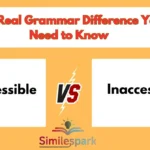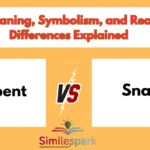Ever stumbled across unaccessible online and thought, “Wait… isn’t it inaccessible?” You’re not alone. These two words look similar, sound identical, and share the same idea—but only one is grammatically correct in modern English.
In this guide, we’ll dive deep into the linguistic history, usage, and meaning of “unaccessible vs inaccessible.”
You’ll learn which one’s right, why the other lingers around, and how to use the correct form confidently in writing and speech.
Let’s clear the confusion once and for all.
Prefix Power: Understanding “Un” vs “In”
The confusion between unaccessible and inaccessible begins with two tiny but mighty prefixes: un– and in–.
Prefixes change the meaning of a base word. Both “un–” and “in–” mean “not,” but they come from different linguistic families.
Here’s a quick look:
| Prefix | Function | Root Origin | Common Examples | Notes |
|---|---|---|---|---|
| un– | Reversal or negation | Old English | unhappy, unfair, unlocked | Native English words |
| in– | Negation or absence | Latin | invisible, incomplete, inaccurate | Latin-derived words |
The prefix “un–” tends to attach to native English roots.
The prefix “in–” prefers Latin-derived roots.
Since “accessible” comes from Latin (“accessibilis”), the proper prefix is “in–”, giving us “inaccessible.”
Think of it like this:
- Un– fits English-origin words (like unfriendly).
- In– fits Latin-origin words (like invisible).
That’s why inaccessible feels right—it follows English’s deep-rooted pattern of prefix matching.
Historical Origins: How “Inaccessible” Became Standard
The story goes back to Latin, where the word accessibilis meant “able to be approached.” Add the Latin prefix “in–” (meaning “not”), and you get inaccessibilis—“not able to be approached.”
From Latin, the word passed through French (inaccessible) before entering Middle English. It’s been part of the English language since the 15th century, and every major dictionary recognizes only inaccessible as the correct spelling today.
Fun fact:
Early English writers occasionally used unaccessible, but by the 1800s, it had virtually disappeared from formal literature.
A quick glance at Google Books Ngram Viewer (if you check it yourself) shows inaccessible completely dominating usage by the 20th century, proving it’s the standard.
The Grammar Verdict: Which Word Is Correct?
Let’s cut straight to it:
✅ Correct: Inaccessible
❌ Incorrect: Unaccessible
Why? Because of etymological consistency.
English follows an unspoken rule: match the prefix to the root’s origin. Since accessible comes from Latin, it pairs with the Latin prefix in–.
Compare These Examples
| Incorrect | Correct |
|---|---|
| Unaccurate | Inaccurate |
| Undecent | Indecent |
| Uncomplete | Incomplete |
| Unaccessible | Inaccessible |
These examples highlight the pattern. Words of Latin origin take in–, not un–.
So next time you’re tempted to write unaccessible, remember—it’s like saying unpossible instead of impossible. It sounds familiar but isn’t grammatically right.
Why “Unaccessible” Still Appears
Even though unaccessible is wrong today, it still pops up occasionally. Here’s why:
1. Historical Usage
Some 16th- and 17th-century authors, like early translators, used unaccessible before the language standardized. For instance, early Bible translations occasionally used unaccessible light.
2. Modern Typos
The prefix un– is more common and intuitive in English, so writers often default to it accidentally.
3. Autocorrect and Predictive Text
Many devices don’t flag unaccessible as incorrect, leading to unintentional misuse online.
4. Regional Influence
Some dialects and informal speech patterns might allow unaccessible, though no region officially recognizes it as correct.
A quick real-world search (e.g., Reddit, Twitter, or product reviews) reveals thousands of hits for unaccessible—proof that even the internet struggles with prefixes.
Correct Usage in Real Contexts
Formal Writing
In formal, academic, or professional writing, always use inaccessible.
Examples:
- “The glacier remained inaccessible during winter months.”
- “Certain classified archives are inaccessible to the public.”
- “The minister spoke about providing access to services once inaccessible to rural communities.”
Formal writing values precision. Using unaccessible here would make your text look careless or unedited.
Informal Writing
In informal chats or social media, you might see unaccessible. People often type it without realizing.
Example:
“Ugh, the website’s unaccessible again!”
While understandable, it’s still incorrect. If you want to sound grammatically confident, go with inaccessible every time.
Digital & Tech Context
In the digital age, “inaccessible” often describes websites, files, or data that can’t be reached.
Examples:
- “This webpage is inaccessible due to a server error.”
- “The database became inaccessible after the update.”
You’ll never find unaccessible in technical documentation by Microsoft, Google, or Apple—they all use inaccessible.
Clarifying Meaning: What “Inaccessible” Really Means
Definition:
Inaccessible (adjective) — not able to be reached, entered, used, or understood.
The word can describe physical, digital, or abstract situations.
Physical
Used when something can’t be reached or entered.
- “The valley was inaccessible after the landslide.”
Digital
Used when data, networks, or sites can’t be reached.
- “Due to high traffic, the server is inaccessible.”
Figurative
Used when something is too complex or out of reach mentally or socially.
- “Her theories were inaccessible to most readers.”
- “He lived an inaccessible lifestyle, detached from reality.”
Synonyms and Near Equivalents
Want to diversify your vocabulary? Here are several words that convey a similar idea to inaccessible.
| Synonym | Typical Use | Example Sentence |
|---|---|---|
| Unreachable | Physical or digital distance | “The tower was unreachable due to flooding.” |
| Unattainable | Goals, ambitions | “Perfect happiness feels unattainable.” |
| Impassable | Roads, routes | “The mountain pass was impassable after the storm.” |
| Remote | Distant or isolated places | “The remote village was almost inaccessible.” |
| Unapproachable | People or attitudes | “He has an unapproachable demeanor.” |
| Unobtainable | Objects or goals | “Some rare materials are unobtainable on Earth.” |
Using the right synonym depends on the situation. Inaccessible often has a broader scope—it can apply to physical barriers, technical problems, or abstract concepts.
Common Mistakes to Avoid
Here are a few traps writers often fall into when choosing between unaccessible and inaccessible.
- Using “unaccessible” in formal documents.
→ Always incorrect; it weakens credibility. - Overcorrecting and avoiding “un–” entirely.
→ “Unhappy,” “unfair,” and “unknown” are perfectly fine; just know which root each prefix pairs with. - Assuming both are interchangeable.
→ They’re not. Only inaccessible is grammatically and academically accepted. - Confusing with “unapproachable.”
→ “Unapproachable” refers to people; “inaccessible” refers to things, places, or ideas.
Quick tip:
If the base word looks Latin or French (ends with –ible, –ate, –al), it probably needs in–.
Regional & Dialectal Insights
Historically, unaccessible showed up more in British English writings from the 1600s–1700s. But even in the UK, dictionaries like Oxford English Dictionary list it as obsolete or nonstandard.
Modern English—both British and American—recognizes only inaccessible as correct.
Here’s what major dictionaries say:
- Merriam-Webster: Only inaccessible is listed.
- Cambridge Dictionary: Defines inaccessible as “difficult or impossible to reach or get.”
- Oxford Learner’s Dictionary: Marks unaccessible as “obsolete.”
So, regardless of your region, inaccessible is universally accepted.
Quick Reference Guide
Here’s a simple cheat sheet to remember:
| Situation | Correct Word | Example |
|---|---|---|
| Academic or business writing | Inaccessible | “The data remained inaccessible.” |
| Informal writing | Inaccessible | “That cave’s inaccessible today.” |
| Technology & digital use | Inaccessible | “Server remains inaccessible.” |
| Speech or dialect | ❌ Unaccessible | Avoid using. |
When in doubt, stick to inaccessible—it’s clear, professional, and correct.
FAQs
What is the difference between “unaccessible” and “inaccessible”?
Answer: Inaccessible is the correct form. Unaccessible is an outdated or mistaken version that isn’t accepted in modern English.
Why is “inaccessible” preferred over “unaccessible”?
Answer: Because “accessible” is Latin-based, and Latin words take the prefix in– rather than un–.
Is “unaccessible” ever correct?
Answer: Only in historical contexts or direct quotes from old texts. It’s not grammatically valid today.
What does “inaccessible” mean?
Answer: It means something can’t be reached, entered, or understood—physically, digitally, or figuratively.
What are synonyms for “inaccessible”?
Answer: Common alternatives include unreachable, unattainable, impassable, and remote.
Conclusion: Clarity Over Confusion
Words evolve, but grammar still values structure. Between “unaccessible vs inaccessible,” only one aligns with English’s deep linguistic roots—inaccessible.
Remember the rule:
Latin roots prefer Latin prefixes.
So, whenever you write about something out of reach—a mountain, a website, or even an idea—use inaccessible with confidence.
Final thought:
“When in doubt, go with what’s accessible to reason—and that’s inaccessible.”










